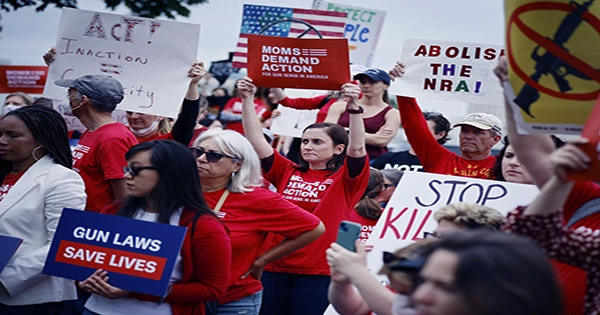With the May 2022 bloodshed in Uvalde, Texas, and Buffalo, New York, calls for Congress to adopt gun regulation have resurfaced. Since the 2012 tragedy at Sandy Hook Elementary School in Newtown, Connecticut, which killed 20 children and four staff members, legislation addressing mass shootings has failed to clear the Senate. We asked political scientists Monika McDermott and David Jones to explain why further restrictions are never enacted, despite the fact that a majority of Americans prefer stricter gun legislation. Mass murders are getting increasingly common. Despite this, no comprehensive gun reform has been enacted in reaction to this and previous mass shootings. Why?
Monika McDermott: While there is typically a tiny majority in favor of regulating gun availability a little bit more than the government already does, that support tends to rise in the short term following incidents like the recent mass killings. Even gun owners, we’ve found, are in favor of limits such as background checks for all gun transactions, even those at gun shows. As a result, that’s one that everyone can get behind. The other point that gun-owning families agree on is that law police should not be allowed to take weapons away from persons who have been legally determined to be unstable or dangerous.
Those are two limits on which the American public may almost unanimously agree. However, agreement on certain aspects isn’t enough. This isn’t something that people are screaming for, and there are so many other factors at play right now, such as the economy, that people are much more concerned about. People are also concerned about the federal budget imbalance, and health care is a recurring issue in the United States. As a result, these issues are at the top of the public’s priority list when it comes to gun control legislation.
As a result, you must consider more than simply majority support for legislation; you must also consider priorities. People in the office are concerned about the priorities. If someone isn’t going to vote them out due to a problem, they aren’t going to vote them out. The other difficulty is that you and non-gun-owning households have very different perspectives on the gun situation. Nearly half of the population lives in a home with a firearm. And those who live in gun-owning homes are far less concerned than those who live in non-gun-owning households about the possibility of a mass shooting in their neighborhood. They’re also unlikely to claim that stronger gun restrictions would make mass shootings less dangerous.
People who do not own firearms believe the contrary. They believe that firearms are hazardous. They believe that limiting access would lower the number of mass shootings. So there’s this schism among the American population. And this is one of the reasons why Congress can’t or won’t act on gun regulation. What is the relationship between public opinion and what Congress does or does not do? Jones, David: People would prefer to believe that members of Congress are listening to their constituents. That, I believe, is their primary concern when deciding how to prioritize topics and how to vote on them.
But there’s also the question of what a member’s “constituency” means. If they’re a House member, we may talk about their geographic constituency, which is everyone who lives in their district, or in their state if they’re a senator. But we may also discuss their electoral constituency, which includes all of the individuals who voted for them to be elected. So, if a congressmember’s goal is to win reelection, they want to keep their electoral constituency’s votes. It’s possible that it’s more essential to them than equitably representing everyone in their constituency.
Only 24% of Americans who voted for a Republican House member in the most recent congressional election in 2020 wanted to make it more difficult to acquire a gun. So, when comparing the views of your voters to those of your whole geographic constituency, it’s your voters that count the most. And a party’s core base might be much smaller and less pro-gun control. Before running in the general election, a member may have to compete in a party primary. What would be the most generous support for gun control in the United States right now? A little more than 60% of Americans.
However, not every member of Congress in their area has such a high level of support for gun regulation. Local legislators aren’t always concerned with national polling results. You could certainly get a majority of 50 Democrats plus Susan Collins and one or two additional Republicans in the Senate to approve some type of gun restriction right now. However, it would fail to pass the Senate. Why isn’t a simple majority sufficient to pass? The filibuster in the Senate is a practice that allows a small number of senators to block a bill’s final vote until a three-fifths majority of senator’s votes to stop them. Monika McDermott: This is a highly contentious political issue right now. However, individuals must keep in mind that this is how our system was built.
















